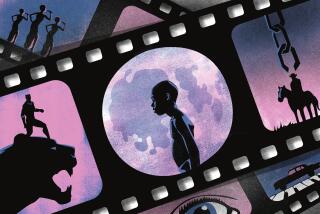Name Game Includes African Roots, Originality : Babies: The quest for individuality began in ‘60s and ‘70s, touching off a search outside mainstream to invent names or dust off ancestral ones. Blacks, in particular, have raised naming to an art.
- Share via
ATLANTA — Long before YaMaya Cimone Pugh was born, her mother already had picked her name.
“I had known a young lady several years ago named YaMaya, and I always said if I had a daughter I would name her YaMaya. I just named her that because it was different,” said LaRhonda Gilstrap, a 22-year-old computer science student.
She’s not alone. Among those sharing the nursery with YaMaya recently at Crawford Long Hospital in Atlanta: Tria Armania Holloway, Jamecia Thermutus Hawkins and Ja-Min O’Haad Newson.
The explosion of originality in naming children has touched nearly every class, race and region, but experts say it is most pronounced among black Americans.
“Blacks are refusing to take white people’s names,” said Leonard Ashley, author of “What’s in a Name?” and an English professor at Brooklyn College in New York. “They are saying, ‘We are different. We are going to have our own Christmas holiday, we are going to have our own names.’ ”
At the turn of the century, the 10 most popular names in each sex category sufficed for half of all boys and girls, Ashley said.
Today, the top 10 account for an estimated 25% of all American names, he said. Much of the other 75%, he said, are names rarely seen in this country until recent years, if at all.
The quest for originality and individuality began in the politically turbulent 1960s and ‘70s. For black parents, the search has meant going outside the WASP mainstream to invent names or dust off ancestral ones, Ashley said.
“Basically, the majority of African-Americans are now naming outside the tradition,” said Jerrilyn McGregory, a professor of African-American studies and English at the University of Georgia.
“It’s a statement of cultural identity,” she said. “Some people predicted it to be a fad, but it seems to be going beyond one generation.”
No one has had more influence than the late Alex Haley, whose book, “Roots,” inspired many black Americans to trace their African origins.
Kinte, the surname of the book’s hero, Kunta, began popping up across the country, as did Kizzie, the character’s daughter, McGregory said.
Atlanta bookstore owner Nia Damali was Pat before she changed her name to reflect her African roots in 1986, when she published her book “Golden Names for an African People.”
Her 6-month-old son, Sekou Ebun Malika, has an African forename.
“People said, ‘Where did you get that name? Is his father African?’ I said, ‘Well, he’s African-American,’ ” said Damali.
Funmilayo Nonye-John, a native of Nigeria who has been a maternity ward nurse at Crawford Long for the last five years, said black parents frequently ask her to help them choose an African name.
“I try to educate people how to give a name,” she said. “People make up names. There’s a lot of ‘sha’ names that are not really African names.”
Some don’t care whether a name is African as long as it has a nice ring to it and isn’t Anglo-Saxon. The result is a treasure trove of appellations pieced together from various sources--Swahili, Yoruba, Spanish, French--and a lot of imagination.
“Blacks are creating names out of bits and pieces of names,” Ashley said. “The main thing they sound is African-American. They’re fake African names, but they are genuine African-American names.”
“Da,” “La,” “Sha” and “Ja” have emerged as among the most popular ingredients. Hence Lavar, LaKeisha, LaTonya, Jabar, Sheshandra and Daquisha.
For her master’s thesis, McGregory analyzed black birth records from Gary, Ind., from 1945 to 1980. Over the years, there were more and more unconventional names. Of 274 girls born in 1980, 213 had different names. Some names differed only in spelling; she found 40 versions of Tamika, for example.
The names symbolize the degree to which black Americans have felt excluded from American life, she said.
“It’s like a gift,” McGregory said. “It’s like saying, ‘I can’t give you much, but I can give you a name no one else will bear.’ ”
More to Read
Sign up for Essential California
The most important California stories and recommendations in your inbox every morning.
You may occasionally receive promotional content from the Los Angeles Times.












